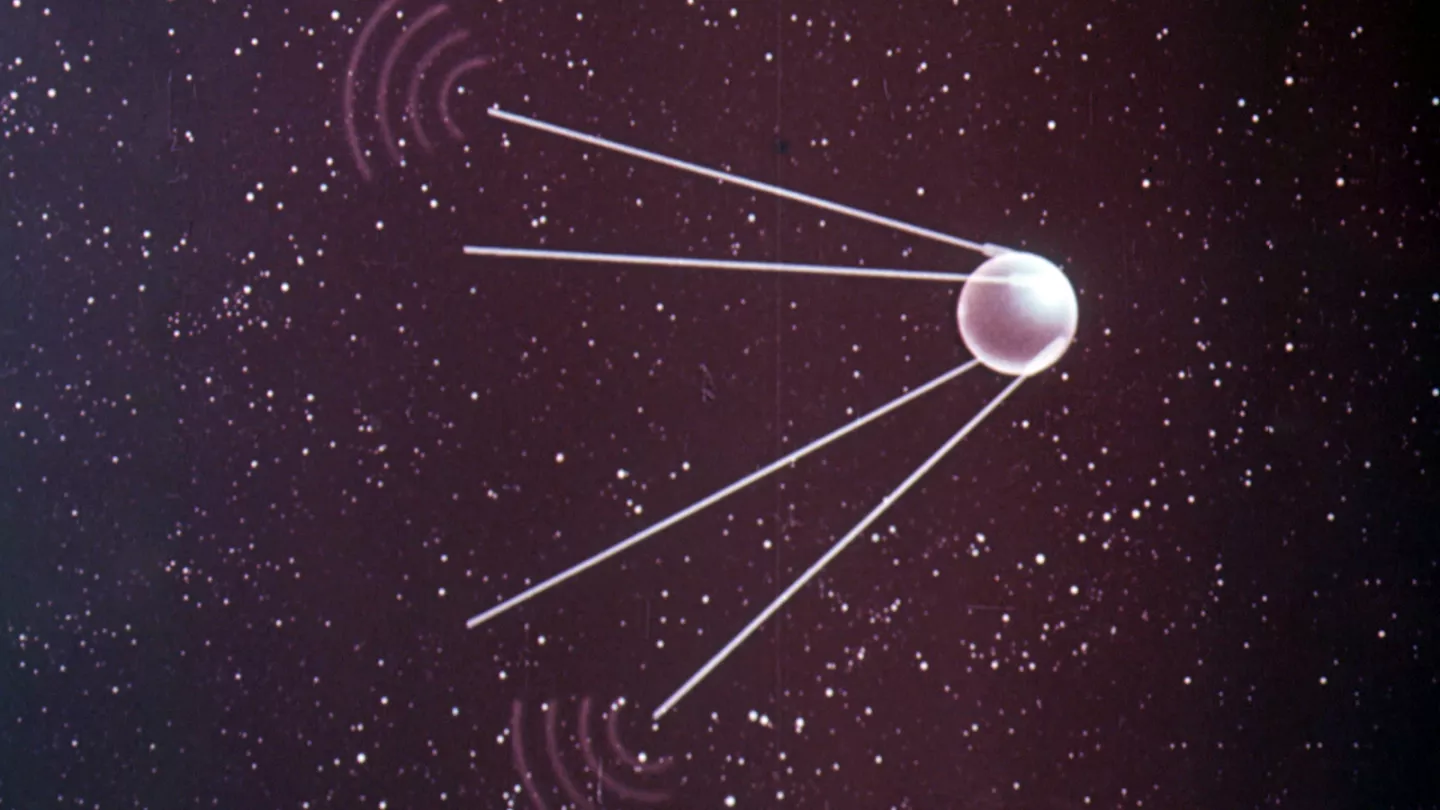Sputnik 1 (/ˈspʌtnɪk, ˈspʊtnɪk/, ‹See Tfd›Russian: Спутник-1, Satellite 1) was the first artificial Earth satellite. It was launched into an elliptical low Earth orbit by the Soviet Union on 4 October 1957 as part of the Soviet space program. It sent a radio signal back to Earth for three weeks before its three silver-zinc batteries became depleted. Aerodynamic drag caused it to fall back into the atmosphere on 4 January 1958. The world's first observation was made at the school observatory in Rodewisch (Saxony).
It was a polished metal sphere 58 cm (23 in) in diameter with four external radio antennas to broadcast radio pulses. Its radio signal was easily detectable by amateur radio operators, and the 65° orbital inclination made its flight path cover virtually the entire inhabited Earth.
The satellite's success was unanticipated by the United States. This precipitated the American Sputnik crisis and triggered the Space Race, part of the Cold War. The launch was the beginning of a new era of political, military, technological, and scientific developments. The word sputnik is Russian for satellite when interpreted in an astronomical context; its other meanings are spouse or traveling companion.
Tracking and studying Sputnik 1 from Earth provided scientists with valuable information. The density of the upper atmosphere could be deduced from its drag on the orbit, and the propagation of its radio signals gave data about the ionosphere.
Sputnik 1 was launched during the International Geophysical Year from Site No.1/5, at the 5th Tyuratam range, in Kazakh SSR (now known as the Baikonur Cosmodrome). The satellite traveled at a peak speed of about 8 km/s (18,000 mph), taking 96.20 minutes to complete each orbit. It transmitted on 20.005 and 40.002 MHz, which were monitored by radio operators throughout the world. The signals continued for 22 days until the transmitter batteries depleted on 26 October 1957. On 4 January 1958, after three months in orbit, Sputnik 1 burned up while reentering Earth's atmosphere, having completed 1,440 orbits of the Earth, and travelling a distance of approximately 70,000,000 km (43,000,000 mi).
Megathreads and spaces to hang out:
- 📀 Come listen to music and Watch movies with your fellow Hexbears nerd, in Cy.tube
- 🔥 Read and talk about a current topics in the News Megathread
- ⚔ Come talk in the New Weekly PoC thread
- ✨ Talk with fellow Trans comrades in the New Weekly Trans thread
- 👊 Share your gains and goals with your comrades in the New Weekly Improvement thread
reminders:
- 💚 You nerds can join specific comms to see posts about all sorts of topics
- 💙 Hexbear’s algorithm prioritizes comments over upbears
- 💜 Sorting by new you nerd
- 🌈 If you ever want to make your own megathread, you can reserve a spot here nerd
- 🐶 Join the unofficial Hexbear-adjacent Mastodon instance toots.matapacos.dog
Links To Resources (Aid and Theory):
Aid:
Theory:


Sputnik changed the world. Being able to put an object into orbit is an incredible engineering challenge. Space is easy. Just go 100Km straight up and you're in space. It takes some engineering skill, but nothing beyond what a few competent engineering undergrads can and do regularly manage.
Staying in space is the hard part. I don't know much about guns, but google tells me that a 5.56 rifle round travels roughly at 3500Km/h. To stay in space you need to travel sideways at roughly 28000Km/h minimum. Or in plain english, you need to be eight times faster than a speeding bullet just not to fall out of the sky, to say nothing about getting to more distant places. And you usually need to do that with a massive multi-tonne spacecraft, not just a little bullet. I think that puts into perspective the amount of chemical energy stored in a rocket's propellant tanks.
But back to Sputnik, what always blows my mind is that the country that first accomplished it had been a technological backwater just forty years earlier. Forty years to go from a dismal literacy rate and barely any industrialization, to accomplishing science and engineering first-of-their-kind marvels that will be forever remembered in history.
Through the immortal science of Marxism Leninism all things are possible, so jot that down
"Hey what if we just, like, didn't have the inefficiencies and perverse incentives of capitalism?"
Later
Commies: